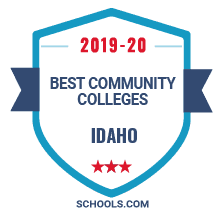CTE in Idaho
For those who want to move quickly from the classroom to the workplace, a career technical education may be ideal. These programs, known as CTE, teach practical skills for specific occupations and can be completed in two years or less.
Nationally, CTE programs are divided into 16 career clusters. However, CTE in Idaho uses six "super clusters" that have been created to reflect the state's workforce needs. Within each cluster are pathways outlining the education needed for related jobs. For instance, the trades and industry cluster includes pathways to construction, manufacturing and transportation jobs.
To help CTE students be successful, Idaho offers the following resources and programs.
- Each of the best Idaho community colleges has a transition coordinator to help students select the right college program based on their high school CTE courses.
- The state offers several scholarships to eligible students, including the Idaho Opportunity Scholarship, which can be used to offset the cost of CTE programs.
- CTE Advanced Opportunities can accelerate student learning by granting college credit for high school coursework or technical education classes.
Visit the websites of the top community colleges in Idaho for more information on their CTE programs. Plus, take the time to learn more about CTE in Idaho by visiting the links below.
- CTE Programs - You can view all six super clusters and learn about CTE career options on the Idaho Career and Technical Education website.
- Next Steps Idaho - Geared toward high school students, this website, sponsored by the Idaho State Board of Education, is another CTE resource.
Transferring Credits in Idaho
If you're hoping to transfer to one of the top four-year schools in Idaho after finishing your associate degree, you'll want to know about the options in place to help the process go as smoothly as possible. Here's a quick list of the most comprehensive policies and initiatives regarding college transfer in Idaho:
- In 2015, the Idaho State Board of Education approved a Statewide General Education Policy that ensures that students who finish an A.A. or A.S. degree at one accredited Idaho college are considered to have satisfied the general education requirements for an Idaho bachelor's degree.
- Individual universities in Idaho feature transfer pathways or articulation agreements that enable seamless transitions for incoming transfer students. The University of Idaho, for example, has such agreements in place with all four of our top Idaho community colleges.
Transfer agreements may even be active between your community college and out-of-state universities, particularly those in neighboring states like Washington, Montana and Utah. Remember to meet with your adviser if you're planning a transfer — there may be more ways to make it work than you realize. Don't forget to also read our guide on how to transfer schools for more information on transfer agreements in general.
Resources for Community College Students in Idaho
Idaho State Board of Education - The State Board of Education offers information on scholarships and educational initiatives at all levels.
Idaho Career and Technical Education - Dedicated to CTE in Idaho, this government website is a comprehensive resource on pursuing a career technical education in the state.
Idaho Department of Labor - This government department also has career information on its website as well as details about apprenticeships and other training opportunities.
Methodology
Using the National Center for Education Statistics' Integrated Postsecondary Education Data System (IPEDS), we generated a list of colleges and universities that met the following criteria:
- Level of institution is either "At least 2 but less than 4 years" or "Less than 2 years (below associate)"
- Data is reported for all 14 ranking variables listed in the Methodology section
We ranked the resulting community colleges member schools on multiple factors related to educational opportunity, student performance and student services. Each school was scored on a 10-point scale, using the following data points:
- The published in-district tuition and fees, National Center for Education Statistics, 2018
- The published in-state tuition and fees, National Center for Education Statistics, 2018
- The in-district per credit hour charge for part-time undergraduates, National Center for Education Statistics, 2018
- The in-state per credit hour charge for part-time undergraduates, National Center for Education Statistics, 2018
- Percentage of students receiving financial aid, National Center for Education Statistics, 2016
- Percent of students that transferred to a 4-year institution and completed within 8 years, College Scorecard, 2017
- The graduation rate in 150% time, National Center for Education Statistics, 2017
- Full-time student retention rate, National Center for Education Statistics, Fall 2017
- Student-to-faculty ratio, National Center for Education Statistics, Fall 2017
- Percentage of students enrolled in distance education, National Center for Education Statistics, 2017
- Flexibility, based on the following data points from the National Center for Education Statistics, 2018
- Whether the school offers credit for life experiences
- Whether the school offers programs of study that can be completed entirely in the evenings and on weekends
- Whether the school offers on-campus day care for students' children
- Whether the school offers any kind of alternative tuition plan. These may include, but aren't limited to, payment plans or guaranteed rates.
